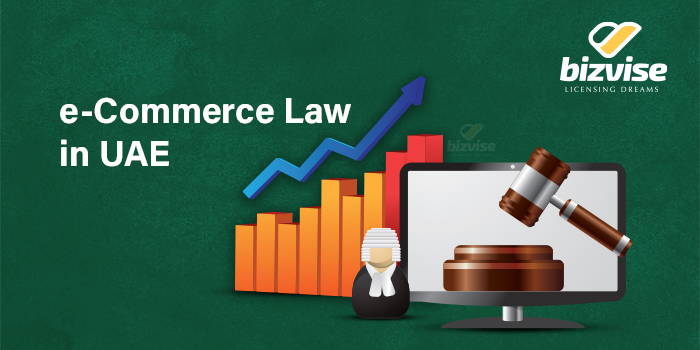
e-Commerce Law in UAE
The Federal Decree-Law No. 14 of 2023 on Commerce through Modern Means of Technology (e-commerce) aligns with the UAE's strategic direction for digital transformation
1. The e-commerce law in the UAE is compatible with international digital commerce trends.
2. Empowered by a dynamic legal framework, the UAE e-commerce law license in Dubai seamlessly incorporates the responsibilities of both federal and local entities across the entire e-commerce value chain. This includes compliance with the Central Bank's digital payment gateway requirements, adherence to the Federal Tax Authority and the TDRA, and meeting the cybersecurity standards mandated by federal and local entities.
3. The UAE e-commerce law license in Dubai ensures the safeguarding of consumer interests, encompassing the protection of intellectual property rights in the acquiring goods or services through contemporary technological means. Additionally, it mandates the implementation of robust technological protection measures, fostering a secure environment for consumers to purchase Clear Terms and conditions of sale
4. Privacy Policy and data protection
5. goods and services. The legislation also oversees the regulation of refund and exchange procedures for goods and services in Dubai.
6. Sell the goods or services that are legally permissible to sell and refrain from selling any goods or services through modern technological means that require special approvals from the Competent Authority before obtaining them as per e-commerce law in UAE.
7. Refrain from using misleading methods or providing incorrect data that does not show the true description of the good or service
8. Provide a detailed non-paper invoice of the purchase of goods and services through modern technological means
9. Return of Goods or Services
10. Insurance, electronic fraud cyberattack risks, and other risks.
Bizvise is your strategic partner in navigating the intricate landscape of e-commerce law in the UAE. From licensing to compliance and beyond, we ensure that your e-commerce venture operates within the bounds of the law, fostering sustainable growth and success.
highlights of e-commerce law
1. With a UAE e-commerce law license in Dubai, the legislation perfectly matches international digital commerce trends, taking a flexible approach to improve corporate efficiency and offer excellent services for consumers within the country.
2. It emphasizes the key role of entities and authorities responsible for licencing and regulating e-commerce, as well as the associated logistic services and digital payment gateways.
3. The e-commerce law in UAE expands its scope to include allied logistic services and digital payment gateways, emphasizing the critical role of businesses and agencies responsible for licensing and regulating e-commerce.
4. To protect consumer interests, the law addresses intellectual property rights while acquiring goods or services using contemporary technologies. It also requires adequate technological safeguards for secure transactions, while regulating refunds and exchanges of products and services.
5. The UAE e-commerce law license in Dubai legalizes trade performed using modern technology, making such transactions similar to old techniques and procedures.
6. It harmonizes the functions of federal and local entities across the whole e-commerce value chain with the UAE e-commerce law license in Dubai. This is made feasible by adaptive legislation geared to fulfil the Central Bank's standards for digital payment gateways, as well as the requirements of the Federal Tax Authority and the TDRA. It also covers the cybersecurity responsibilities of both federal and local agencies.
7. It governs the cooperation obligations of key federal and local agencies and is guided by the UAE e-commerce law license in Dubai. This includes getting the appropriate permits from local entities involved in the digital transformation of commercial activities, as well as complying to the e-commerce licensing standards outlined by economic development agencies.
8. The e-commerce license in Dubai creates an optional authority for the integration of supervisory, regulatory, and judicial control operations.
9. It organizes the relationship between the merchants (B2B) and the relationship between the digital merchant and the consumer (B2C).
10. The e-commerce Law in UAE organizes the relationship between parties of digital contracts and protects online consumers and relevant parties. It organizes digital payment gateways in coordination with the relevant entities in the country.
According to a technology law expert, a new e-commerce law now in effect in the United Arab Emirates (UAE) represents another crucial step towards clear and effective regulation of the fast-increasing digital commerce sector.
The law, which goes into effect in September 2023, establishes a broad set of norms and regulations for enterprises operating in "trading through modern technology means," which includes digital commerce, e-commerce, and social commerce. Its scope covers website commerce, platforms, smartphone apps, social media, virtual storefronts, and new laws.
The new law establishes the standards that must be met when trading via modern technological means, such as providing a technically secure environment for online trading and meeting cybersecurity requirements, prioritizing consumer privacy, avoiding the use of misleading data or methods to describe and promote goods and services, complying with competition law requirements, and ensuring business continuity plans are in place.
It gives consumers certain rights, such as the ability to return digitally purchased goods or services; to communicate with the digital merchant to rate their experience or submit complaints; to choose whether to receive advertising or marketing campaigns via phone calls, emails, or social media platforms; and to have their consumer information and data secured and protected. It also provides dispute resolution methods for e-commerce disputes, including a dispute resolution committee formed by the Ministry of the Economy, and arbitration for digital contracts of a value higher than AED 50,000 (approx. US$13,600).
Other recently introduced laws related to the e-commerce license in Dubai which is relevant to the digital commerce sector in the UAE are the Consumer Protection Law and the Law on the Protection of Personal Data.